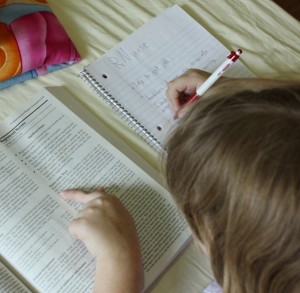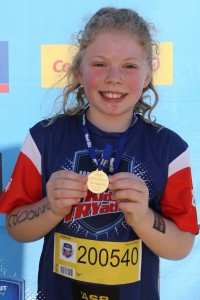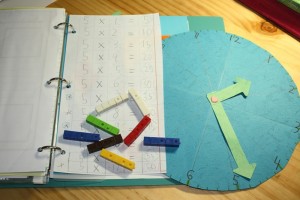Keywords: Classical, Charlotte Mason, Unit Studies, Primary Aged, Structured
Children: Two – 11yrs, 8yrs
The girls always follow a timetable as I find it is the only way of making certain that by the end of the week we have covered the correct amount of each subject and we get to our group classes on time! We always do maths, literacy, instrument practise and exercise daily. Then we add in geography, history, Spanish, Latin, biology, physics, chemistry, technology, personal project time, programming, art and music theory. A typical day for my eight year old might be … maths, personal project time, geography, art-history (combining literacy), dance class, instrument practise, and touch typing. A typical day for my eleven year old might be … physics (combining maths), personal project time, grammar, geography, history (combining literacy), dance class, instrument practise, and art. We try to see friends every day and this is often during a class. Although we pack a lot into our day, the children only work the same hours as they did at school. That frees up all the time before and after school because there is no travelling time, no homework and even instrument practise takes place during the day when the girls are still feeling fresh! We always do our academics in the morning and leave the afternoons, whenever we can, for exercise, technology, music and art. We have a different focus each term – we have had fitness terms, exam terms, arts terms and unit study terms. The amazing thing about homeschooling is that you are not locked into a whole year of something.
Keywords: School-At-Home, Primary Aged, Preschoolers, Structured
Children: Three – 11yrs, 9yrs, 4yrs
Homeschooling for us has changed dramatically from when we first started – from unschooling to more to less structure. A typical day starts at 7.00am with breakfast, dishes, chores, then playtime. At 9.00am we come to the table together to do family bible devotions (this ranges from reading a book, bible study character study, and plays), and this is followed by history/geography at 9.30am for half an hour. My children are learning cursive writing so we do this at 10.00am before having a 20min morni ng tea break which I set using the timer on the stove. My two older children then work through the following in any order until they are finished which is usually about 12.30pm or 1.00pm: spelling, maths (two different purchased curriculums to suit each child’s learning style), writing (eg. dictation, writing I have set, their own choice of writing, proof-reading, etc), reading on their own, and reading to me (we look at different genres, writing conventions, intonation, etc – this often covers various topics from science to social studies depending on the books selected). Then it is lunch time and the structured part is over for the day. Afternoons are spent just being at home, hanging out with friends and other families, or joining in various activities with our local homeschooling group (eg. swimming lessons, dancing, art classes, cricket, netball, soccer, boys brigade, girls brigade, helping out at preschool, craft group, theatre productions). Some days we forgo the structured morning for outings, science experiments, Newspapers in Education, lapbooks, etc – but those days would be the exception to add variety and for a change.
ng tea break which I set using the timer on the stove. My two older children then work through the following in any order until they are finished which is usually about 12.30pm or 1.00pm: spelling, maths (two different purchased curriculums to suit each child’s learning style), writing (eg. dictation, writing I have set, their own choice of writing, proof-reading, etc), reading on their own, and reading to me (we look at different genres, writing conventions, intonation, etc – this often covers various topics from science to social studies depending on the books selected). Then it is lunch time and the structured part is over for the day. Afternoons are spent just being at home, hanging out with friends and other families, or joining in various activities with our local homeschooling group (eg. swimming lessons, dancing, art classes, cricket, netball, soccer, boys brigade, girls brigade, helping out at preschool, craft group, theatre productions). Some days we forgo the structured morning for outings, science experiments, Newspapers in Education, lapbooks, etc – but those days would be the exception to add variety and for a change.
Keywords: School-At-Home, HomeEd/School Mix, Gifted, Primary Aged, Structured
Children: Two – 10yrs, 6yrs (at school)
My son suits a highly structured system with a tight time table. This is a typical day:
8.45-ish Piano and trumpet practice till 10.30-11.00am
Feed chooks, pat goats, kiss horses noses
Maths program (purchased curriculum) for approximately one hour
Lunch and jump on trampoline, kiss goats, pat horses, play with kitten
Extra times-table practice for 20 minutes
Snack break, a few chores, more trampoline
Programming, English (purchased curriculum) or science or art
Finish at 3.30pm
Reading fills gaps before lessons, every evening before bed, when travelling in car or during any other down time. Once a week he goes to One Day School for gifted kids.
Keywords: Waldorf/Steiner, Primary Aged, Preschoolers, Structured
Children: Three – 8yrs, 5yrs, 17mths
My 5yr old daughter goes to a Steiner kindy three mornings a week. A big part of Steiner philosophy is that there is no formal learning until 7yrs-ish so neither she nor our youngest child do any homeschooling although they come along on trips and do their own drawing or painting at the same time as us. My 8yr old son reads to himself or plays until about 9.30am every morning. Then he does his chores and we go outside on fine days for biking, scootering, soccer, handball, games, etc; or if it is raining we do some yoga or other inside games. We have morning tea then we start ‘circle time’ where we light a candle, read some morning verses, poems, do movement and beanbag games, fingerplays and songs for about 15 minutes. We also write down our weekly Whakatauki (Maori proverb) to try and memorise. Some of the verses and songs stay the same all year but most change each week or seasonally. We have a 5 minute break then start the ‘main lesson’ which is focused on a particular topic or block (eg. maths, language arts, or nature) over the period of about a month, and relates to a yearly theme. This year our theme is saints, heroes, fables and folktales; and we use stories on these to explore our block (eg. maths, language arts, etc). The main lesson is 45-60 minutes and finishes with an ending verse. We have lunch and about an hour break then we do the ‘middle lesson’ which is time to do something with our bodies – on Mondays we go swimming; Tuesdays we play the pentatonic flute, learn about a composer, style of music or learn a new song to sing; Wednesdays we go for a nature walk or activity like gardening, looking at insects, birds, etc; Thursdays we learn French or Te Reo. The ‘end lesson’ is something we do with our hands – on Mondays we draw, Tuesdays and Wednesdays is craft, Thursdays is watercolour painting. Every afternoon we end with a story relating to the block we are working on or a seasonal story. On Fridays our structure is much looser and we often do baking or cooking and housework. My son is free to do some ‘natural learning’ so he often reads about and looks on the computer for things that interest him, or he plays outside.
Keywords: Te Kura, School-At-Home, Teens, Structured
Children: Three – 18yrs, 17yrs, 16yrs
I have two teenagers at home studying for NCEA full time at Te Kura after being homeschooled all the way through, and a third teen who is now at university. My children get up when suits (I only rouse them if it gets to 9.30am and I still haven’t seen them!). My son typically eats a big breakfast while he does his physics or maths booklets, my daughter doesn’t like breakfast and will go straight into some work. With Te Kura the parent is the supervisor – I make sure the children are progressing with their work and I liaise with the teachers on the children’s behalf. On Mondays we go over their goals from the previous week and we set some realistic goals for the current week for each subject (eg. to finish chapter 7 by Friday, or send in the Digital Tech assignment to the teacher by Friday). I also check my records of their schoolwork to see if their work has been marked and returned (sometimes the Te Kura teachers are very slow and I need to follow up with them). Most days the children and I meet together in the lounge while my son folds his community newspapers ready to deliver them or while someone folds the washing. We talk about the week, events coming up, maybe have a pep talk if there is a lack of progress! I will read something to them that I think is useful that they might not read themselves. We will revise memory work and because we are Christians we also pray together at this time. The actual work takes place anywhere in the house. Now that they are older they are often in their rooms but they will also work on the desk in the corner of the lounge, on the couch or lying on the floor. If it’s something they need help with then they work at the kitchen table so I can help out. We have lunch together and also dinner (when my husband can be home too). The rest of the day we are more separate. Sometimes the children will do some study after dinner and spend a few hours studying on a Saturday. Having said this, there is no such thing as a typical day. Every day there are interruptions, horse riding, Spanish lessons, piano lessons, tennis, or whatever activities are planned for the term.
Keywords: School-At-Home, Single Child, Primary Aged, Structured
Children: One – 8yrs
A typical day for us would be as follows:
8.00am Wake up and start housework together, breakfast
9:30am Read a book or chat
10.00am Lessons are done online using a purchased curriculum (breaks added in as needed)
12.00pm Lunch
2.00pm Finish any lessons as required, read a bit together, play, go for a walk, etc
This changes depending on if we have something on during the day. Lessons are done inside or outside depending on the weather.


